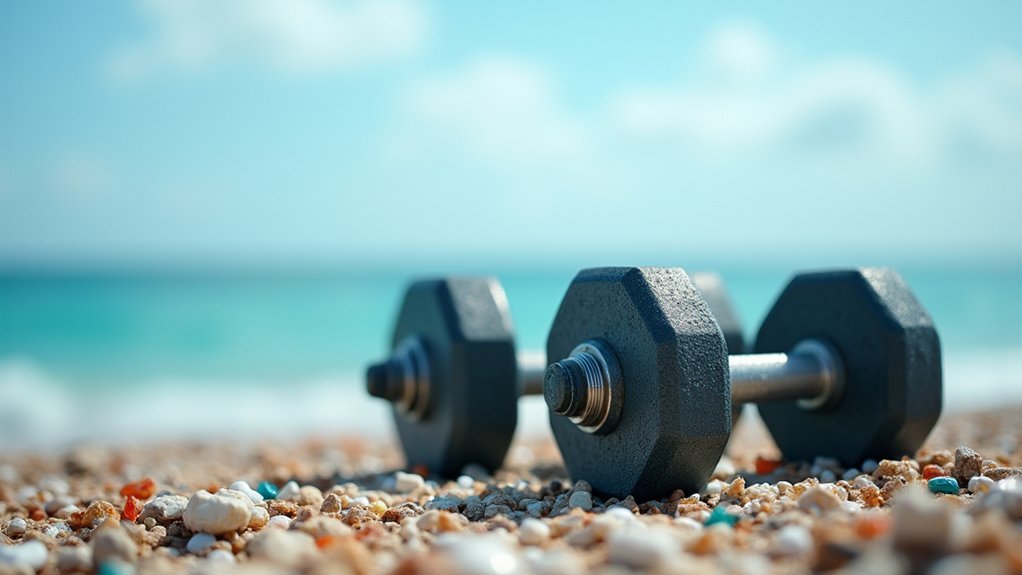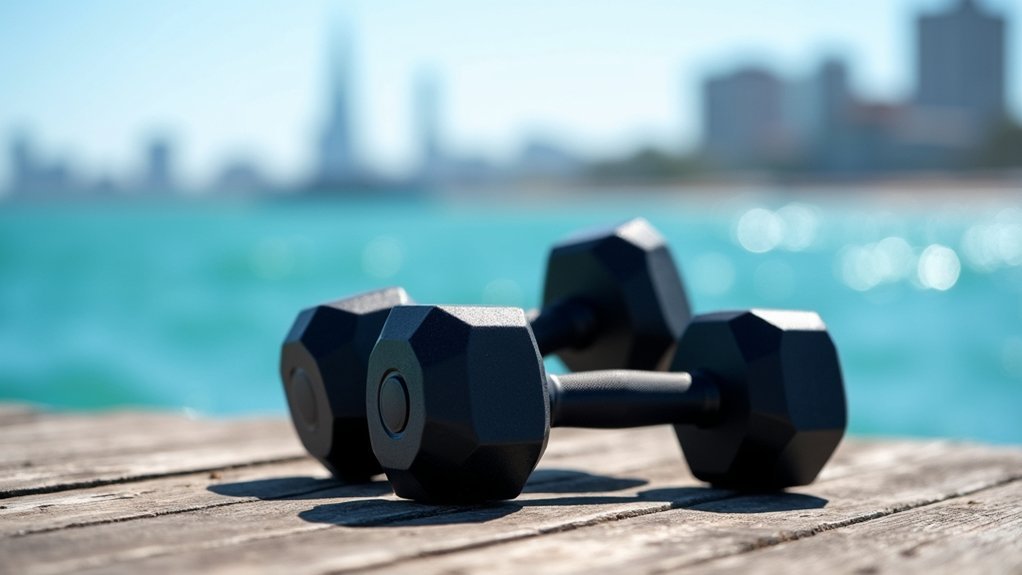You might not realize the powerful impact your fitness choices can have on ocean ecosystems. As marine plastic pollution continues to threaten global marine life, innovative fitness brands are transforming discarded ocean plastics into high-performance workout equipment. These sustainable weights aren’t just environmentally responsible—they represent a cutting-edge solution to one of our planet’s most pressing ecological challenges. Curious how recycled ocean plastic is revolutionizing the fitness industry and helping clean our oceans?
Key Takeaways
- Eleiko, Casall, and Paragon are pioneering fitness brands transforming ocean plastic waste into high-quality workout equipment and weights.
- The innovative process involves collecting discarded marine plastics, shredding them into fragments, and molding them into precise fitness tools with enhanced durability.
- By converting plastic waste into functional gym equipment, these brands help reduce marine pollution and support ecological restoration efforts.
- Companies like Casall have committed to ambitious sustainability goals, targeting 50% of their home training tools to be made from recycled materials by 2025.
- Sustainable fitness equipment demonstrates that environmental responsibility and product performance can successfully coexist in the modern fitness industry.
The Global Plastic Crisis and Ocean Pollution

While the world grapples with escalating environmental challenges, the global plastic crisis has emerged as a critical threat to our oceans and marine ecosystems. The construction industry and single-use plastics are driving massive resource extraction and waste generation, with approximately 8 million metric tons of plastic entering oceans annually. These recycled ocean plastic sources create devastating environmental impacts, transforming marine habitats into dangerous pollution zones where microplastics contaminate entire food chains.
You can understand the magnitude of ocean pollution through stark statistics: 50% of global resource extraction contributes to plastic waste, with single-use items like bags and bottles representing primary culprits. Innovative approaches focusing on recycled materials offer promising solutions, transforming destructive waste streams into sustainable products that reduce environmental harm and protect marine ecosystems.
Innovative Brands Transforming Ocean Plastic Into Fitness Equipment

Although traditional fitness equipment manufacturing has long relied on virgin materials, innovative brands are now pioneering a transformative approach by repurposing ocean plastic into high-performance workout tools. Companies like Eleiko, Casall, and Paragon are leading sustainable development in fitness equipment by integrating recycled plastic into weightlifting gear and home training tools.
You’ll find brands strategically converting ocean plastics into durable workout equipment, demonstrating a scientific commitment to environmental responsibility. Casall has set an ambitious target of producing 50% of their home training tools from recycled or bio-based materials by 2025. Manufacturers like WaterRower and Fitwood are complementing this approach by utilizing sustainably sourced wood and exploring innovative recycling techniques.
These initiatives represent a critical step towards reducing environmental impact while maintaining high-quality fitness equipment.
How Recycled Ocean Plastic Weights Are Made

The innovative approach of converting ocean plastic into fitness equipment represents a sophisticated engineering challenge that transforms environmental waste into functional workout tools. Manufacturers carefully collect marine debris like discarded fishing nets and plastic waste, then meticulously process these materials using specialized techniques. By shredding collected plastics into small fragments, they can melt and mold the recycled material into precise weight specifications.
Brands utilizing recycled material often incorporate additional additives to enhance durability and performance, ensuring the weights can withstand intense training demands. The production process focuses on sustainability, leveraging energy-efficient machinery and minimizing waste generation. These recycled plastic weights not only provide high-quality fitness equipment but also contribute to significant environmental cleanup efforts, effectively turning potential ocean pollution into practical, performance-driven workout gear.
Environmental Impact of Choosing Sustainable Gym Equipment

Since environmental sustainability has become a critical global concern, choosing gym equipment made from recycled ocean plastics represents a powerful strategy for reducing marine pollution and promoting ecological restoration. By selecting products made from recycled materials, you’re directly contributing to lower carbon emissions and supporting circular economy practices. Sustainable gym equipment transforms waste into functional fitness tools, preventing plastics from damaging marine ecosystems while creating high-performance training gear. Brands like Eleiko and WaterRower demonstrate that eco-friendly manufacturing can simultaneously address environmental challenges and deliver superior product quality. Your conscious choice to use recycled ocean plastic weights considerably impacts waste reduction, encourages innovative manufacturing processes, and sends a strong market signal supporting environmental responsibility in the fitness industry.
Top Brands Leading the Charge in Ocean Plastic Fitness Solutions

Wave after wave of innovative fitness brands are transforming marine plastic pollution into cutting-edge workout equipment, championing a sustainable approach to gym gear. While the [FACTS] showcase brands using recycled materials, the challenge of ocean plastic remains significant. Companies are now developing weights made of recycled plastic bottles, turning a major challenge into an opportunity for environmental restoration.
Brands like Eleiko and Casall are demonstrating that sustainable fitness equipment isn’t just possible—it’s even better. By reimagining waste as a resource, these manufacturers are creating high-performance gear that reduces marine debris while meeting stringent quality standards. Their approach transforms potential ocean pollutants into durable, functional fitness tools, proving that environmental responsibility and performance can coexist seamlessly in the modern fitness industry.
Consumer Guide: Selecting Eco-Friendly Workout Equipment
Beyond innovative manufacturing, conscious consumers increasingly seek workout equipment that aligns with environmental stewardship. When you need to make sustainable fitness choices, look for brands like Eleiko and WaterRower that uses recycled materials strategically. Casall, one of the world’s leading eco-conscious fitness brands, already incorporates 25% recycled or bio-based materials in their equipment, with ambitious goals to expand sustainability.
Consider brands around the world prioritizing sustainable sourcing. Fitwood offers natural Scandinavian wood from well-managed forests, while Paragon uses sustainably sourced African Iroko wood. Your selection should evaluate equipment lifecycles, focusing on transparency in material sourcing and measurable environmental commitments. By prioritizing brands with genuine sustainability practices, you’ll invest in fitness gear that supports both personal health and planetary well-being.
Frequently Asked Questions
Does Recycling Plastic Really Make a Difference?
You’ll see recycling’s real impact when you understand its role in ocean cleanup, reducing carbon emissions, and raising consumer awareness. It’s not just about sorting—it’s a critical solution for environmental sustainability.
What Company Reuses Ocean Plastics?
Imagine turning beach trash into fitness gear! Bionic Gym’s innovative approach transforms ocean plastics into eco-friendly workout equipment, supporting plastic waste reduction and sustainable fashion while actively contributing to ocean clean-up efforts through purposeful product design.
Does Coca-Cola Use Recycled Plastic?
You’ll find Coca-Cola’s sustainability efforts directly address recycled plastic benefits through corporate responsibility initiatives. They’re committed to using 50% recycled PET plastic in bottles by 2030, actively contributing to plastic waste reduction and environmental conservation.
Is It Safe to Wear Clothing Made From Recycled Plastic?
You’ll help remove 60 plastic bottles from oceans with each recycled garment! Clothing made from recycled plastic meets rigorous safety standards, offers impressive fabric durability, and supports environmental impact while ensuring consumer awareness of sustainable fashion choices.
Conclusion
You’re part of a critical solution when choosing recycled ocean plastic weights. With approximately 8 million tons of plastic entering oceans annually, every sustainable fitness choice matters. By supporting brands transforming marine waste into high-performance equipment, you’re not just improving your workout—you’re directly contributing to global environmental restoration. These innovative products represent more than exercise gear; they’re a tangible strategy for reducing plastic pollution and protecting marine ecosystems.
